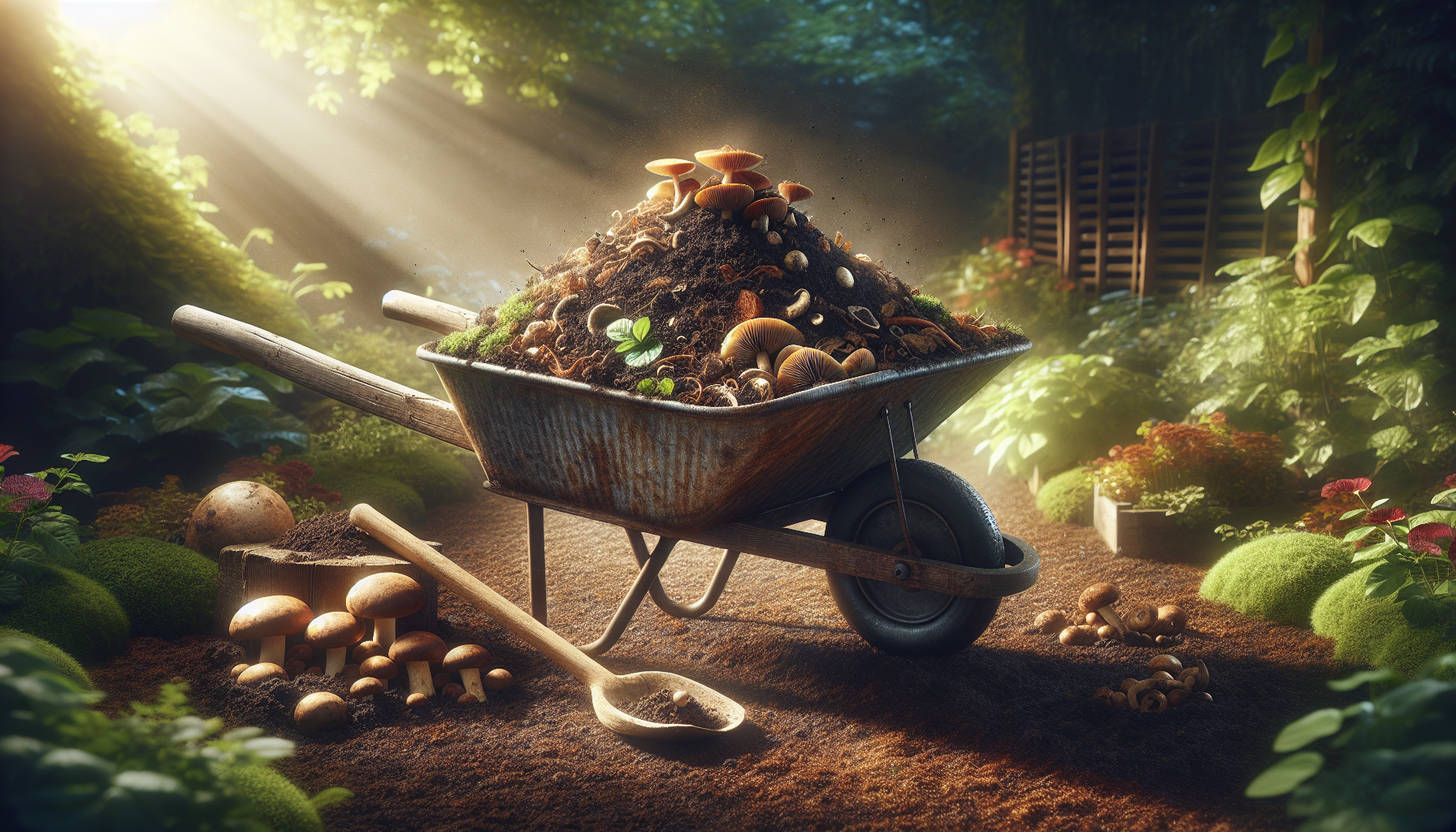Should I Mix Mushroom Compost With Regular Soil Or Use It On Its Own?
Are you wondering whether you should mix mushroom compost with regular soil or use it on its own in your garden? This article will provide you with all the information you need to make the best decision for your soil and plants.

What is Mushroom Compost?
Mushroom compost, also known as mushroom soil, is a type of organic material used to improve soil quality. It is made from the leftover substrate used to grow mushrooms. This substrate typically consists of a mixture of materials such as straw, hay, corn cobs, gypsum, and other organic matter. Once the mushrooms have been harvested, this substrate is often composted to create a nutrient-rich soil amendment.
Benefits of Using Mushroom Compost
Using mushroom compost in your garden can provide a wide range of benefits. Here are some of the key advantages of using this organic material:
- Nutrient-Rich: Mushroom compost is rich in essential nutrients such as nitrogen, phosphorus, and potassium, which are vital for plant growth.
- Improves Soil Structure: The organic matter in mushroom compost helps improve soil structure, making it more conducive to root growth and water retention.
- Balances pH Levels: Mushroom compost can help balance the pH levels of your soil, creating a more hospitable environment for plants.
- Suppresses Diseases: Some studies have suggested that mushroom compost may help suppress certain soil-borne diseases, reducing the risk of plant infections.
Using Mushroom Compost as a Soil Amendment
You can use mushroom compost as a soil amendment by mixing it into your existing soil. This can help improve soil fertility and structure, creating a healthier environment for your plants to thrive. When using mushroom compost in this way, it is essential to consider the current condition of your soil and the needs of your plants.
Learn about mushroom composting
Mixing Mushroom Compost With Regular Soil
When deciding whether to mix mushroom compost with regular soil, there are several factors to consider. Here are some key points to keep in mind:
- Soil Type: Consider the type of soil you have in your garden. If your soil is heavy clay or sandy, adding mushroom compost can help improve its texture and fertility.
- Plant Needs: Different plants have varying nutrient requirements. Ensure that mixing mushroom compost with regular soil will meet the specific needs of the plants you are growing.
- pH Levels: Test the pH levels of your soil before adding mushroom compost. If your soil is already too acidic or alkaline, mixing in compost could further imbalance the pH levels.
How to Mix Mushroom Compost With Regular Soil
To mix mushroom compost with regular soil effectively, follow these steps:
- Assess Your Soil: Determine the current condition of your soil, including its texture, pH levels, and nutrient content.
- Calculate the Ratio: Decide on the ratio of mushroom compost to regular soil based on your soil assessment and plant needs. A common ratio is 1 part compost to 3 parts soil.
- Mix Thoroughly: Blend the mushroom compost and regular soil together thoroughly to ensure an even distribution of nutrients and organic matter.
- Apply to Garden Beds: Spread the mixed soil evenly over your garden beds, and gently work it into the top layer of soil.
Using Mushroom Compost as a Topdressing
In addition to mixing it with regular soil, you can also use mushroom compost as a topdressing for your garden beds. This method involves applying a layer of compost on top of the soil to provide a slow release of nutrients and improve soil structure over time.
Benefits of Using Mushroom Compost as a Topdressing
- Slow Release of Nutrients: Mushroom compost applied as a topdressing provides a steady supply of nutrients to plants as it breaks down gradually.
- Improved Moisture Retention: The organic matter in mushroom compost helps retain moisture in the soil, reducing the frequency of watering.
- Weed Suppression: Applying a layer of mushroom compost can help suppress weed growth by blocking out sunlight and preventing weed seeds from germinating.

Using Mushroom Compost in Container Gardens
If you have a container garden, you can also use mushroom compost to improve the quality of your potting mix. This can help provide essential nutrients to your plants and improve moisture retention in the containers.
How to Incorporate Mushroom Compost in Container Gardens
- Mixing with Potting Mix: Blend mushroom compost with your regular potting mix to create a nutrient-rich soil mixture for your containers.
- Adding as Topdressing: Apply a layer of mushroom compost on top of the potting mix in your containers to provide a slow release of nutrients.
- Watering Consistently: Due to the increased water retention capabilities of mushroom compost, be mindful of watering needs in container gardens to avoid waterlogging.
Tips for Using Mushroom Compost Effectively
When using mushroom compost in your garden, keep the following tips in mind to ensure optimal results:
- Compost Maturity: Ensure that the mushroom compost you are using has fully matured and decomposed to avoid any potential issues with fresh compost.
- Mulch Benefits: Consider using mushroom compost as a mulch to protect the soil surface, retain moisture, and suppress weed growth.
- Regular Testing: Periodically test your soil pH levels and nutrient content to monitor the impact of mushroom compost on your garden.
- Moderation is Key: While mushroom compost offers many benefits, using it in moderation is essential to prevent nutrient imbalances in the soil.
Final Thoughts
In conclusion, the decision to mix mushroom compost with regular soil or use it on its own depends on your specific gardening goals and plant needs. Whether you choose to blend it with existing soil, use it as a topdressing, or incorporate it into container gardens, mushroom compost can be a valuable addition to your gardening toolkit. Experiment with different methods and ratios to find what works best for your garden and enjoy the benefits of this nutrient-rich soil amendment.

